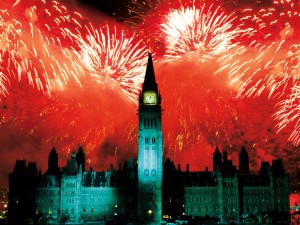There was a superb collection of brainy and passionate literary warriors last night in Ottawa. (I was there, too!) Session One of another evening at the Writers’ Festival was titled “Canada: The Imagination of Place”, and it took the often-banal national navel-gazing to a level of intelligent feeling that we don’t often don’t come near.
B.W. Powe discussed and read from his (again) newly revised A Canada of Light, which examines the philosophy and perception underlying the country. He is not without self-confidence, and describes the book as “my ‘Leaves of Grass’, my attempt to do for Canada what Walt Whitman did for the United States”. Or maybe he just meant that the centre of his life and thought is right there, and he keeps going back ‘til he gets it right. (Did Whitman do the same?) “We should celebrate the solitudes and the strangeness of this country,” he says, “because Canada works very well in fact, just not in theory!” Canada offers to the world, he argues, not a mirror but “a new premise, a new ethic” based on what he calls, oxymoron intended, a “radical rootlessness”. Yes, he invokes Innis and McLuhan, and has something of the wild-eyed romantic about him. Powe, eloquently and forcefully, puts forward a poetic vision of the country, one that opposes the ever-present forces that subvert hopefulness and joy. He wants us to understand what is in front of our faces right now, to “face the present! For the future is implicit in it.” Powe is passionate and lyrical about our country, its place in an evolving world, and would like for all of us to see it more clearly.
So would Andrew Cohen, whose While Canada Slept bemoaned our loss of moral (not to mention military and diplomatic) influence in the world, has now come out with The Unfinished Canadian. He examines the Great Northern Project from a more historic and political viewpoint — our collective choice of evolution over revolution — and his urgently practical manner was an interesting counterpoint to Powe’s visionary urbanity (“Beware! Beware! His flashing eyes, his floating hair!”). Substituting as he was for Roy McGregor (who was puck chasing with Sidney Crosby and the Senators), Cohen told a hockey story to illustrate one of his strongest points. After the hail of criticism that fell on the Canadian women’s hockey team (and the women’s game itself) as they stir-fried their opponents at the Torino Olympics, star Cassie Campbell had to wonder. “Just what is it about this country that we get slammed for excellence?” Ah, the tall poppies. They must be cut down to size! Cohen decries our poor grasp of our own history, and our reflexive anti-Americanism, dismissing the recent bestseller Fire and Ice precisely because it panders to our desperate urge to see ourselves not only as separate from the Americans but, well, better than them. While there are real differences, Cohen finds it rather unbecoming to “protest too much” (and so inaccurately). He’s an unabashed nationalist, however. To the charge that nationalism is so 19th-century, such a violent albatross from the past, he responds with a call for civic nationalism: pride in our institutions, in the ethics and practices we have evolved and the good things Canucks have made and done in the world. It is, on the other hand, the ethnically based nationalism, he argues, that is limiting and has such rich harvests of bigotry, war and misery. It was all good stuff.
Next up was the third of the Writers’ Festival’s “Writing Life” series, featuring two men I’d never heard of and a third I’d never read. I find writers sharing their work unfailingly interesting, but I was particularly impressed last night. Neil Smith read from his debut collection of short stories, Bang Crunch. Having been a student in Montreal when the 1989 massacre of 14 women occurred – and with Virginia Tech reverberating in every mind – Mr. Smith read from a disturbing mass-murder tale of his own invention. He has an unusual reading voice and style, and was quite compelling. I’ll be paying more attention. C.S. Richardson is another first-time author, after a distinguished and ongoing career in the visual arts and design. (He was the designer of Smith’s book, for example.) What an engaging person and writer: his character descriptions flow beautifully, unpredictably, in his novel The End of the Alphabet. Because of what he selected, I have little idea of the plot, but sign me up – this is a novel I want to read.
The third writer, Lawrence Hill, has made a sensation with his newest novel, The Book of Negroes. It is a shameful omission that I haven’t read him before. For one thing, he’s from my neck of the southern Ontario woods, but his background couldn’t be much different – intellectual American parents, a white mother and black father who came to Canada to escape bigoted attitudes (and laws) toward racially mixed marriages. He has been writing the stories of his own family, of the African diaspora and especially the North American experience of it. His reading from Negroes was outstanding. He has told this story of many stories in the voice of an African woman, from her youth in what is now Mali, her enslavement and her release from it after the American Revolutionary War, a Black Loyalist move to Nova Scotia and one of the first back-to-Africa voyages ever made by a black community. At the beginning of the novel, and again at the end, we listen to her as an elderly woman in Britain at the height of the movement to abolish the slave trade. With this year marking 200 years since that epochal change, Hill’s timing is excellent but, more importantly, he has the story and he has the voice. It’s funny: I’ve never read the man before, but one night in his company has made me a big fan. He is gracious, enormously eloquent, and there’s a quiet fire burning in all that he says and writes.
Chalk up another great night for the wordwatchers. And somehow, the Senators managed to defeat Sidney and the Penguins without me frozen in front of the tube.



